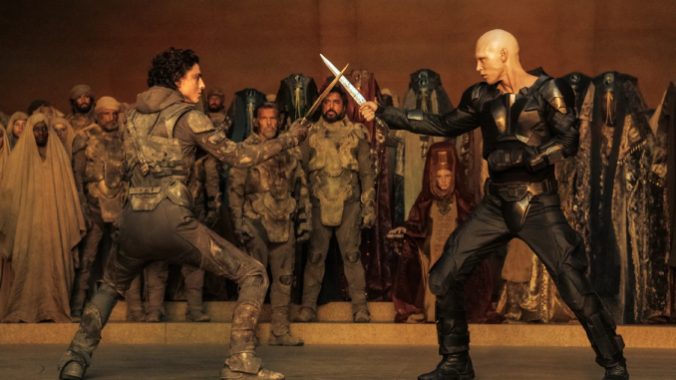Dune: Part Two Completes a Nearly Flawless Adaptation of a Sci-Fi Classic

Ever since the pandemic hit in 2020, studios, movie theaters and Nicole Kidmans everywhere have spent a lot of time trying to convince us that the only real way to experience a movie is via the Big Screen. Yet in an age of ubiquitous—if fragmented—streaming services and increasingly affordable home entertainment technology anchored by 75-inch TVs, it’s a hard sell to convince a family of four that dropping $100+ for the “magic” of Shazam! Fury of the Gods, Dicks: The Musical or Cocaine Bear is worth it. And that’s not meant as a slight against those films—the calculus of whether the viewing experience is sufficiently enhanced by a giant screen and state-of-the-art sound system to offset the cost (and potential annoyance) of public viewing is seldom a question of how good the film is. For many, Are You There God? It’s Me, Margaret, Past Lives and Anatomy of a Fall are going to be just as enjoyable to watch in a darkened living room as in a multiplex. But Denis Villeneuve’s Dune: Part Two? Set aside the complicated calculus of food, shelter and family needs. It’s time to shell out the big bucks and head to the local IMAX. To borrow from Kidman’s AMC commercial more explicitly, though you might not be “somehow reborn,” there will be “dazzling images,” sound you can feel and you will be taken somewhere you’ve “never been before” (at least, not since Dune).
As befits a Part Two, Villeneuve’s film picks up in medias res, with Paul Atreides (Timothée Chalamet), his mother Lady Jessica (Rebecca Ferguson) and the Fremen encountering and dealing with a murderous Harkonnen hunting party while trying to reach the Fremen stronghold. From this encounter, Villaneuve nimbly guides the narrative from one key moment to the next, a veritable dragonfly ornithopter of plot advancement (with a few slower moments to allow the burgeoning relationship with Paul and Zendaya’s Chani to breathe).
If the outcome of each narrative stop feels very much fated, that in turn feels appropriate given the messianic prophecy undergirding the entire tale.
In films centered on seemingly inexorable prophecies, there is usually some amount of dramatic suspense to be mined in how said prophecy will come to pass. A bit of a twist, a bit of surprised recognition that the fate so fought against or fled from turned out to be right where the story was heading all along, protagonist preferences be damned. In Dune: Part Two, there’s no such suspense regarding whether this prophecy will be fulfilled, no narrative sleight of hand allowing room for viewer doubt. The only uncertainty exists, fleetingly, in the minds of some of the film’s characters. Most of these micro-arcs can be summarized as variations of “I don’t think he’s the one. Never mind—I now believe he’s the one!” and “If he’s not the one, he’ll die doing this thing. Never mind—he lived!”
This could be considered a flaw, except Dune: Part Two isn’t trying to be a Christopher Nolan-esque puzzle box for us to decipher and be surprised by. It’s space opera, the current chapter of which just happens to take place on a planet. The story might move dutifully from point A to point B, but the experience is all about the alphabet—or more precisely, about Arrakis itself. To that end, Dune: Part Two is an immersive experience on par with Avatar (but with a much better story), Interstellar (but benefiting from a much richer narrative tapestry) and Mad Max: Fury Road (no notes!).
-

-

-

-

-

-

-

-

-

-

-

-

-

-

-

-

-

-

-

-

-

-

-

-

-

-

-

-

-

-

-

-

-

-

-

-

-

-

-

-








































